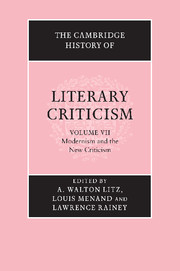Book contents
- Frontmatter
- Introduction
- THE MODERNISTS
- THE NEW CRITICS
- THE CRITIC AND THE INSTITUTIONS OF CULTURE
- 14 Criticism and the academy
- 15 The critic and society, 1900–1950
- 16 The British ‘Man of Letters’ and the rise of the professional
- 17 F. R. Leavis
- 18 Lionel Trilling
- 19 Poet-critics
- 20 Criticism of Fiction
- Bibliography
- Index
- References
16 - The British ‘Man of Letters’ and the rise of the professional
from THE CRITIC AND THE INSTITUTIONS OF CULTURE
Published online by Cambridge University Press: 28 March 2008
- Frontmatter
- Introduction
- THE MODERNISTS
- THE NEW CRITICS
- THE CRITIC AND THE INSTITUTIONS OF CULTURE
- 14 Criticism and the academy
- 15 The critic and society, 1900–1950
- 16 The British ‘Man of Letters’ and the rise of the professional
- 17 F. R. Leavis
- 18 Lionel Trilling
- 19 Poet-critics
- 20 Criticism of Fiction
- Bibliography
- Index
- References
Summary
Today most literary criticism takes place in institutions of higher education, and most literary critics, by virtue of their academic qualifications and institutional employment, are considered (and consider themselves) to be members of a profession. Indeed the widespread use by publishers of the term ‘academic writing’ is an acknowledgement that most of what is called literary criticism is now written for professional and pedagogic purposes. It is rare for the professional critic to address a general (that is a non-academic) audience. A hundred years ago, however, matters were rather different. The professional procedures with which we are now so familiar were then being put into place for the first time, and reaction to them was mixed. In The Importance of Being Earnest Oscar Wilde has Algernon Moncrieff deflate Jack Worthing's intellectual pretensions with the comment: ‘literary criticism is not your forte my dear fellow. Don't try it. You should leave that to people who haven't been at a University.’ Wilde was referring to the newly professionalised academic literary critic, a species from which he constantly and strenuously tried to distance himself. Moreover, he was not unique in his antagonism to professionalisation. For the next thirty years or so a number of critics, located for the most part outside institutional structures, also attempted to resist the discourses of the new academic professionalism. They did so in a variety of ways: they adopted different styles and objectives, wrote on different topics, but principally they addressed their work to a different audience.
- Type
- Chapter
- Information
- The Cambridge History of Literary Criticism , pp. 377 - 388Publisher: Cambridge University PressPrint publication year: 2000
References
- 2
- Cited by

